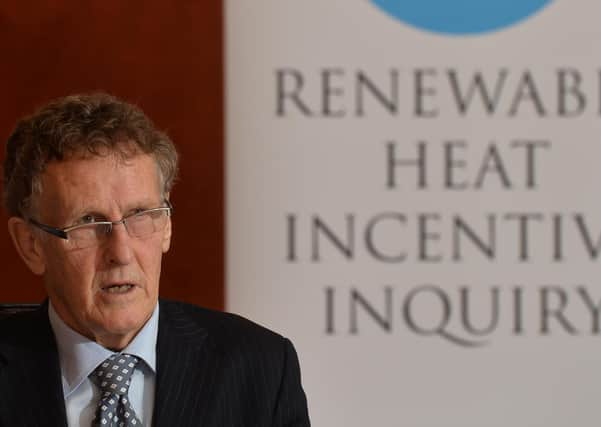RHI Inquiry: Sir Patrick Coghlin issues 48 letters to those facing criticism


The inquiry released the figure in response to a question from the News Letter ahead of the publication of the vast report into how and why the cash for ash scandal happened.
However, the inquiry would not say whether the letters were issued to 48 separate individuals and bodies, or whether some individuals received multiple letters because they disputed the inquiry’s findings.
Advertisement
Hide AdAdvertisement
Hide AdThe letters, which were part of what the inquiry describes as a ‘representations process’, allow witnesses a chance to challenge findings against them which they believe are unfair or based on inaccurate information.
However, the final decision on what the report will say rests with Sir Patrick as chairman of the public inquiry.
His report will be published at 2pm on Friday. Sir Patrick will make a public statement, but will not be taking questions from journalists.
Initially Sir Patrick did not appear to want to partake in a widespread ‘representations process’ – or ‘Maxwellisation’ as it is also known – because it inevitably delays the end of a public inquiry.
Advertisement
Hide AdAdvertisement
Hide AdIn the case of Sir John Chilcot’s inquiry into the Iraq War, the Maxwellisation process led to widespread public and political criticism after the report was delayed more than five years between the final oral evidence and the publication of the report.
In the final week of oral inquiry hearings in December 2018, Sir Patrick said that he did not intend to send routine Maxwellisation letters, saying: “I am not in favour of a routine Maxwellisation – it takes up too much time and as this is a public inquiry, expenditure has to be seen [to be] justified for the public.”
However, that position changed last year in what some sources say was an attempt to head off the possibility of any witness attempting to judicially review the inquiry.
On the final day of inquiry hearings in December 2018, Sir Patrick warned that it is “very likely that some individuals and/or bodies may be subject to quite significant criticism in light of actions or omissions relating to the scheme” but he stressed his “complete determination” to ensure that no one is “treated unfairly”.
Advertisement
Hide AdAdvertisement
Hide AdSince it was set up more than three years ago, the inquiry has issued 815 notices under the sweeping powers of Section 21 of the Inquiries Act 2005 which allow it to compel answers from witnesses and forces them to turn over evidence relevant to RHI.
That process has seen the inquiry accumulate a vast pile of 1.3 million pages of evidence. At its height, the inquiry team had 36 members including the chairman and panel members.
The total bill for the inquiry itself is expected to be published tomorrow. However, by last year the full bill for taxpayers – taking in the fact that witnesses’ legal costs were overwhelmingly publicly funded – was already more than £14 million, and has risen since then.